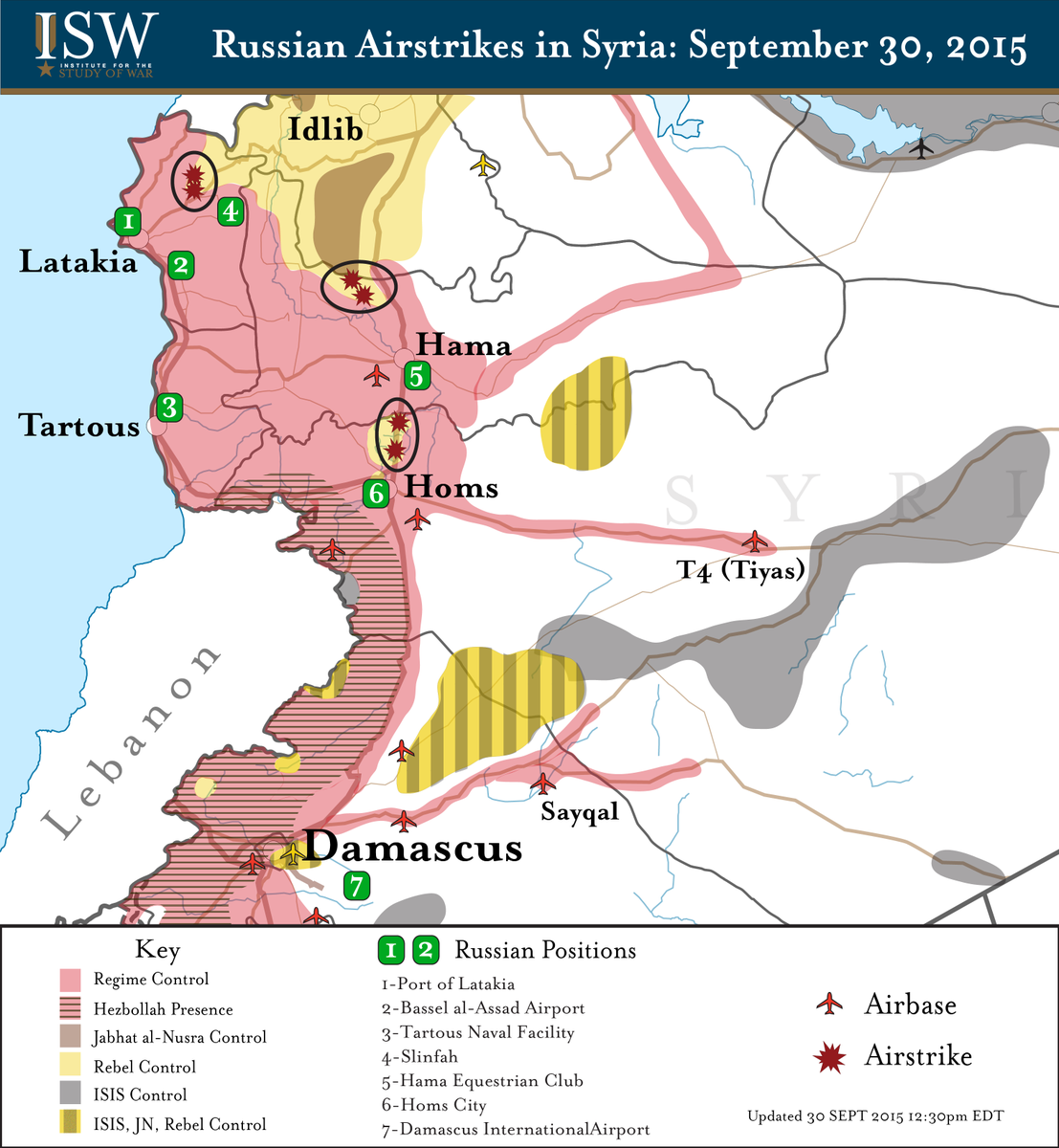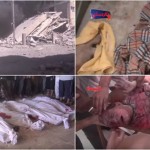The United States was in theater first, and while most world leaders are in New York for the United Nations General Assembly, Vladimir Putin chose not to advise the United States. In fact, a 3-star Russian general based in the new Iraq intelligence cells walked into the U.S. embassy in Baghdad and told the U.S. to get out of Syrian airspace and Russian bombing was commencing in a hour. Putin is fully backing Bashir al Assad against all Western requirements that he leave power as was agreed in 2012.
Be it known, there are more than 100,000 anti-Assad fighters in Syria…Russia could be busy while the Pentagon has no positive choices at this point due to air power confliction in Syria.
This was estimated by the United States but zero courtesy or war rules were followed by Russia. The next question is what will the Saudis do from this point forward?

The Interpreter: Which rebel groups control the areas which were hit today in Homs?
ISW: The groups that control the Talbisa-Rastan rebel pocket north of Homs are: al-Qaeda affiliate Jabhat al-Nusra, Ahrar al-Sham (HASI), and other FSA-affiliated rebel brigades. Unfortunately, we don’t have fidelity on what groups exactly were impacted by the airstrikes today.
Interpreter: Does ISIS have a presence in Homs? Your latest map says no, but some people are pushing back on that because a Daily Mail article published in August showed ISIS reportedly throwing a gay man off a roof in Homs.
ISW: There is ISIS in Homs Province, not in Homs City which is regime-held (with the exception of one neighborhood). The ISIS presence in Homs is primarily in the eastern countryside. For instance, Palmyra (Tadmur) is in Homs Province.
The Daily Mail article is likely referring to an event that happened in one of the ISIS-held villages in the eastern countryside of the province. There are, however, ISIS ‘sympathetic’ elements (i.e. similar in ideology but not officially ISIS) in rebel-held in the areas of Homs and Hama provinces that were hit today with airstrikes. These groups are minimal and are usually rooted out by other rebel brigades in the area.
Interpreter: Any idea which rebel unit was hit today in Al Lataminah, Hama province? The “FSA” commander told Reuters that his unit was hit, and he had recently received anti-tank missiles from a “foreign power.” Any idea what, specifically, they are referencing?
ISW: Tajama’a al-Izza was hit in Al Lataminah. They are an FSA-affiliated TOW anti-tank missile recipient that is active in the provinces of Hama, Idlib, and Aleppo. The TOW missile recipients active in northern Syria are believed to receive these anti-tank missiles from the Turkish Military Operations Command (MOC).
Interpreter: It looks like a member of Tahrir Homs was killed today. Do you know anything about this man or the unit? Do you know the group’s ideological leanings?
ISW: Yes, the airstrikes killed Lyad al-Deek of Tahrir Homs today. Harakat Tahrir Homs is technically a Free Syrian Army affiliate, however in 2015 the once “moderate” Free Syrian Army is largely nominal and is not a good indicator of a rebel group’s ideological leanings. Tahrir Homs, like a lot of the battle hardened opposition remaining in Homs, is an Islamist brigade that is a military ally of Syrian al-Qaeda affiliate Jabhat al-Nusra. The relationship between Nusra and Tahrir Homs with regards to governance was thought of as “uneasy” when Nusra first started to assert itself (and it’s strict version of Shari’a) in Homs, however they have likely grown closer as time has gone on and probably are currently participating in joint rebel governance structures together.
Russian airstrikes on the Rebel-held Rastan & Talbisah, the largest populated cities in Northern #Homs
Russian Actions Intensify Syrian Civil War, Carter Says
By Jim Garamone DoD News, Defense Media Activity
WASHINGTON September 30, 2015 — Russian actions are intensifying the instability in Syria and making the civil war there more vicious, Defense Secretary Ash Carter said here today.
During a Pentagon news conference, Carter said the Russian position of supporting the regime of Syrian President Bashar al-Assad and its desire to take on extremist groups such as the Islamic State of Iraq and the Levant represent a contradiction.
“Fighting ISIL without pursuing a parallel political transition only risks escalating the civil war in Syria – and with it, the very extremism and instability that Moscow claims to be concerned about and aspire to fighting,” he said. “So that approach is tantamount … to pouring gasoline on the fire.”
The secretary restated the American position, saying that a lasting defeat of ISIL and its terrorist allies can be achieved only in parallel with a political transition in Syria. “We will continue to insist on the importance of simultaneously pursuing these two objectives,” he said. “And I would hope Russia would join us in pursuing these objectives.”
Conversation With Russian Defense Minister
Carter spoke with Russian Defense Minister Sergei Shoigu last week, when Russia’s intent to launch strikes in Syria became apparent. “During my phone call with Minister Shoigu, I also told him I was prepared to send a DoD team to meet with Russian defense counterparts, at a location that we agreed upon, to ensure that we avoid any inadvertent incidents over Syrian air space,” he said.
But Russian aircraft struck targets around Homs, Syria, this morning. A Russian officer notified personnel in the U.S. Embassy in Baghdad of the strikes an hour before they launched. No coalition aircraft were in the region at the time, and Carter said he doubts any ISIL terrorists were in the area struck.
Russian and coalition officers will meet in the next few days to “deconflict” air operations. The meeting will allow a flow of information between coalition forces and Russian elements to maintain the safety of U.S. personnel in the region, Carter said.
The meeting also will be an opportunity to ensure that any additional Russian actions do not interfere with the coalition’s efforts to degrade and defeat ISIL, he added.
Mission Against ISIL Will Continue
The secretary stressed that the more-than-60-nation coalition is battling ISIL “across the physical, virtual and ideological battle space,” conducting more than 7,100 air strikes at ISIL’s operational core and logistics arm. “The coalition will continue to fly missions over Iraq and Syria as planned, as we did today, in support of our international mission to degrade and destroy ISIL,” he said.
Carter said the U.S. talks with the Russians over Syria do not indicate a lessening of America’s strong condemnation of Russian aggression in Ukraine, nor do they change U.S. sanctions and security support in response to those destabilizing actions.
“On that subject, the facts remain: If Russia wants to end its international isolation and be considered a global power, it must stop its aggression in eastern Ukraine and its occupation and attempted annexation of Crimea, and live up to its commitments under the Minsk agreement,” he said.

